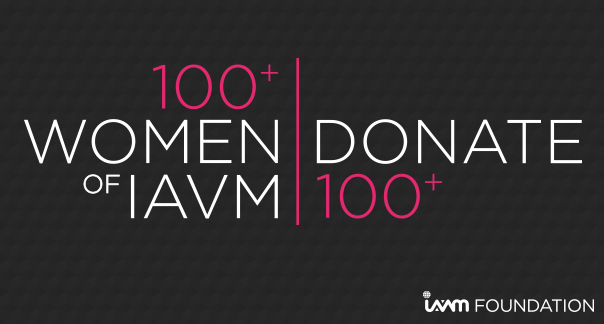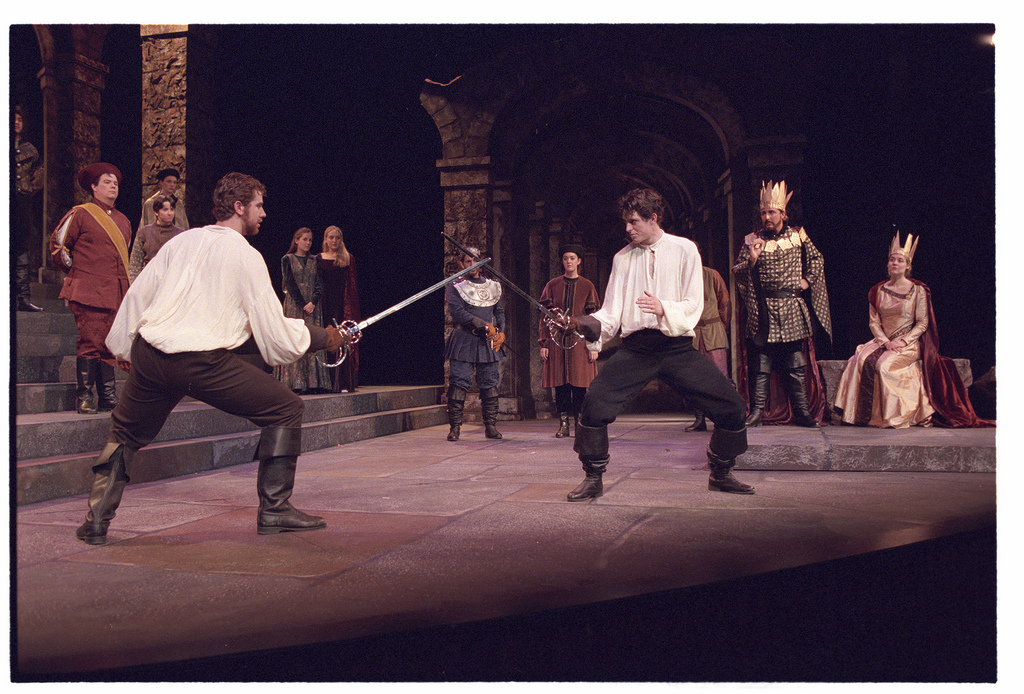Behind Every Great Woman is a Strong Foundation
The IAVM Foundation has recently launched a new program—100 Women of IAVM—specifically created for women by women. By paying it forward and giving US$100 each, we can provide three women with a full scholarship to IAVM conferences each year! There is a new generation of female students, young professionals, and future female leaders, and this is OUR chance to help these women in our industry further develop their careers and skill sets.
BUT, the Foundation needs OUR help in supporting this amazing initiative. The idea is simple—100 Women each giving $100 means $10,000 each year!
I’d like to encourage you to join this elite group of women by visiting the 100 Women of IAVM fundraising page to make your donation today.
Also, when you make your donation you will be asked if you’re willing to mentor one of our female IAVM students. It can be as little as one phone call/email or as much as a life-long mentorship – you decide!
The Foundation remains committed to our success, and I want to ask you to join me in ensuring that they continue to be there when we need them. I’m proud to show my support as one of the 100 Women of IAVM, and I hope you, too, will join me.
Thank you for your support!
An Apple A Day Can’t Keep the Bad Boss Away

Research is linking increased risk of heart attack, high blood pressure, sleep problems, and anxiety to chronic stress caused by daily interactions with a “bad boss.”
“The evidence is clear that the leadership qualities of ‘bad’ bosses over time exert a heavy toll on employees’ health,” said Jonathan D. Quick, an instructor in medicine at Harvard Medical School and a co-author of the book Preventive Stress Management in Organizations. (From Rebecca Shannonhouse / The Washington Post)
In a 2011 article for Psychology Today, Ray Williams references several workplace studies, citing that “a study of 6,000 British office workers found employees who felt that their supervisors treated them fairly had a 30 percent lower risk of heart disease. A 2008 meta-analysis of the connection between health and leadership by Jana Kuoppala and associates concluded that good leadership was associated with a 27 percent reduction in sick leave and a 46 percent reduction in disability pensions. The same study concluded that employees with good leaders were 40 percent more likely to report the highest levels of psychological well being including lower levels of anxiety and depression.”
Williams alludes to a liability question that may be an inevitable next chapter: If research begins providing conclusive evidence that a bad supervisor is a root cause of serious illness, does this create new liabilities for the employing organization?
(photo credit: Sean MacEntee via photopin cc)
Watching Live Theater Produces Positive Benefits
Reading a play is one thing, but seeing it performed live is another. And while I believe one can get a lot out of reading one, more can be gained from seeing in person. If you’re feeling doubtful, let me cue up some recent research from the University of Arkansas.
In a new study, researchers found that students who attended high-quality theater productions gained better knowledge of a play’s plot, increased their vocabularies, grew their tolerances, and improved their abilities to read other people’s emotions.
“What we determined from this research is that seeing live theater produced positive effects that reading a play or watching a movie of the play does not produce,” said Jay Greene, professor of education reform at the University of Arkansas. “Plays are meant to be seen performed live. You can’t always take your kids to a play but if you can, you should. The story can be conveyed in a movie, but it doesn’t engage the viewer in the same way.”
The researchers studied a group of random students, grades 7 through 12, who saw productions of Hamlet and A Christmas Carol. Some participants in the control group and the treatment group also watched movie versions or read the play.
Surveys were then administered around six weeks after the performances. Students who attended the live productions improved their knowledge of the play by a large margin compared to the control group. For example, more than 94 percent of the live-attendance group knew that Ophelia drowns in Hamlet (spoiler alert!), compared to 62 percent of the control group. The students who attended a live performance also scored higher on tolerance and emotional measures compared to the control group.
The study, “Learning from Live Theater: Students realize gains in knowledge, tolerance, and more” is available on the Education Next website.
(photo credit: Burns Library, Boston College via photopin cc)
The Life of a College Student
I have attended the University of Montana in Missoula for the past four-and-a-half years, and the growing trend of technology is continuing to impact the way we live and learn as students. I have personally seen and felt the effects of these changes as they have impacted my collegiate career.
Laptops vs. Handwriting Notes
One decision we face as college students that has a large impact on our academic performance is determining which method of note taking to use: typing on a laptop or handwritten. According to research, those who take notes by hand have better long-term comprehension, and this is the method of note taking I personally prefer. Students who write out their notes by hand have a stronger conceptual understanding and are more successful in applying and integrating the material than those who use their laptops. Students who use their laptops tend to have high verbatim note content, which is associated with lower retention of the lecture material. Students who use laptops can take notes fairly fast, mindlessly, and with little analysis. This fails to promote an understanding or application of the information given.
Online Classes vs. Physical Classes
As college undergrads, we have the option of either taking class at specific time, day, in a specific room, with a professor, or online at anytime, anywhere, and with no instructor. Online schooling has become more popular with the technological resources that are now available. Times are changing everyday, and technology is growing at a rapid pace. As a student, I find learning from a classroom, with a teacher, on the whiteboard to be much more effective. Being able to ask questions, engage in activity, and apply the frameworks is a lot more valuable than any answer Google can offer. There is something to be said about collaboration with others and the benefits group work offers. Talking through the difficult scenarios with others and then being able to explain it to someone else is how we as individuals truly retain knowledge. These benefits are lost by taking a class online. Most people take for granted the power of hands-on learning.
Textbooks vs. Ebooks
With technology growing, as a student I now have the ability to purchase a physical textbook or an online version in a PDF. This issue can be very opinion based. Students now days will more then likely choose the online version, because it is less expensive and more convenient. For me, I like to have the physical copy in hand. I usually end up writing all over it with pen, pencil, and highlighter.
Many will ask what does this have to do with technology? I think that it is important to remember that life is always changing and—whether we are students, have a career, or stay at home—we must adapt to the changes of society. What I don’t think, though, is that we have to completely change our ways. Some things will always be more efficient like computers or technology, but they are not always as effective. As humans, it is in our nature to feel the desire to want to interact with one another and complete our tasks by hand, which is why, using new forms of technology may not come as naturally to me.
(photo credit: danielfoster437 via photopin cc)
Should Your Theatre Charge Per Laugh or Cry?
Pay per Laugh | TeatreNeu from edududu on Vimeo.
Barcelona’s Teatreneu comedy club doesn’t charge a cover fee. Instead, you’re charged per laugh.
The move is an effort to combat falling attendance numbers, due in part to Spanish government taxes on theatre tickets. In order to make money, though, the venue outfitted every seat with iPad that ran facial recognition software. It recorded every time a person laughed at a cost of €0.30 (about US$0.38). The max amount an attendee could pay was set at €24 (US$30).
How well did it work? Watch the video above to find out.
Do you want to receive a Front Row News weekly digest?
Categories
- Allied (861)
- Architecture (147)
- Arenas (747)
- Career (897)
- Convention Centers (895)
- Education (623)
- Events (1,544)
- Food & Beverage (193)
- Foundation (113)
- Guest Experience (1,496)
- Industry News (2,270)
- Leadership (1,888)
- Marketing (150)
- Membership (2,000)
- Music (213)
- Performing Arts Centers (454)
- Professional Development (409)
- Research (127)
- Safety & Security (442)
- Sports (763)
- Stadiums (608)
- Student (159)
- Technology (516)
- Ticketing (92)
- Touring (82)
- Trends (364)
- Uncategorized (742)
- Universities (218)
- Video (25)
- Young Professional (198)
Twitter Feed
- Twitter feed loading
Recent Posts
- Seattle Convention Center Announces Strategic Leadership Appointment and Growth Initiatives for 2026
- Peggy Daidakis Humbly Made Convention Center History
- Welcome to Our Newest Members
- New Member Benefit! IAVM Partners with Advantage Training to Elevate Staff Readiness and Guest Experience
- Charlotte Convention Center Welcomes Two New Leaders to its Management Team
Categories
- Allied
- Architecture
- Arenas
- Career
- Convention Centers
- Education
- Events
- Food & Beverage
- Foundation
- Guest Experience
- Industry News
- Leadership
- Marketing
- Membership
- Music
- Performing Arts Centers
- Professional Development
- Research
- Safety & Security
- Sports
- Stadiums
- Student
- Technology
- Ticketing
- Touring
- Trends
- Uncategorized
- Universities
- Video
- Young Professional
Archives
- December 2025
- November 2025
- October 2025
- September 2025
- August 2025
- July 2025
- June 2025
- May 2025
- April 2025
- March 2025
- February 2025
- January 2025
- December 2024
- November 2024
- October 2024
- September 2024
- August 2024
- July 2024
- June 2024
- May 2024
- April 2024
- March 2024
- February 2024
- January 2024
- December 2023
- November 2023
- October 2023
- September 2023
- August 2023
- July 2023
- June 2023
- May 2023
- April 2023
- March 2023
- February 2023
- January 2023
- December 2022
- November 2022
- October 2022
- September 2022
- August 2022
- July 2022
- June 2022
- May 2022
- April 2022
- March 2022
- February 2022
- January 2022
- December 2021
- November 2021
- October 2021
- September 2021
- August 2021
- July 2021
- June 2021
- May 2021
- April 2021
- March 2021
- February 2021
- January 2021
- December 2020
- November 2020
- October 2020
- September 2020
- August 2020
- July 2020
- June 2020
- May 2020
- April 2020
- March 2020
- February 2020
- January 2020
- December 2019
- November 2019
- October 2019
- September 2019
- August 2019
- July 2019
- June 2019
- May 2019
- April 2019
- March 2019
- February 2019
- January 2019
- December 2018
- November 2018
- October 2018
- September 2018
- August 2018
- July 2018
- June 2018
- May 2018
- April 2018
- March 2018
- February 2018
- January 2018
- December 2017
- November 2017
- October 2017
- September 2017
- August 2017
- July 2017
- June 2017
- May 2017
- April 2017
- March 2017
- February 2017
- January 2017
- December 2016
- November 2016
- October 2016
- September 2016
- August 2016
- July 2016
- June 2016
- May 2016
- April 2016
- March 2016
- February 2016
- January 2016
- December 2015
- November 2015
- October 2015
- September 2015
- August 2015
- July 2015
- June 2015
- May 2015
- April 2015
- March 2015
- February 2015
- January 2015
- December 2014
- November 2014
- October 2014
- September 2014
- August 2014
- July 2014
- June 2014
- May 2014
- April 2014
- March 2014
- February 2014
- January 2014
- December 2013
- November 2013
- October 2013
- September 2013
- August 2013
- July 2013
- June 2013
- May 2013
- April 2013
- March 2013
- February 2013
- January 2013
- May 2012
- March 2012
- December 2011
- November 2011
- October 2011
Recent Comments
- Frank Bradshaw, Ph.D., CVE on John Meyer, CVE, a Tireless Advocate of Certification for Venue Professionals, Has Died
- Neil Sulkes on Hilary Hartung, Friend to Many in Venue Marketing, Has Left Us
- Jason Parker, CVE on The Devastation of Hurricane Helene and How We Can Support One Another
- Larry Perkins on Touhey Testifies Against Speculative Ticketing Before Congressional Subcommittee
- Peter Secord on Major Players for Planned Elkhart Amphitheater Were in the Mix at VenueConnect



